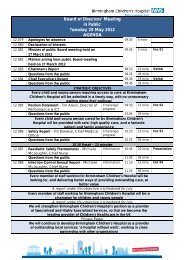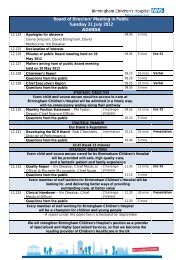Nurses Day! - Birmingham Children's Hospital
Nurses Day! - Birmingham Children's Hospital
Nurses Day! - Birmingham Children's Hospital
Create successful ePaper yourself
Turn your PDF publications into a flip-book with our unique Google optimized e-Paper software.
BACK TO CONTENTS PAGE<br />
Listening to Patients and Families: Tertiary Inpatient Referrals<br />
When a child or young person needs to come to<br />
BCH for urgent inpatient care from home or from<br />
another hospital, it’s important that their admission<br />
is not delayed as this could have a negative impact<br />
on their care. In 2010/11 we decided to make sure<br />
delays did not happen and put processes in place<br />
to meet our goal.<br />
Figure 10: Number of patients not offered a BCH bed within 24 hours 2010/11 - 2012/13<br />
GOAL:<br />
all children<br />
referred for<br />
urgent inpatient<br />
care will be<br />
admitted<br />
within 24<br />
hours<br />
MEASURE:<br />
number of children<br />
per month not offered<br />
a bed within 24 hours<br />
of urgent referral<br />
30<br />
25<br />
20<br />
15<br />
10<br />
5<br />
2010 - 11<br />
2011 - 12<br />
2012 - 13<br />
Listening to Patients and Families: Cancelled Operations<br />
Patients, families and staff have told us that when<br />
an operation has to be cancelled by the hospital<br />
this can have a huge impact. It might mean travel<br />
arrangements and time off school and work have to<br />
be rearranged and could also mean that tests and<br />
assessments have to be done again. We know this<br />
can be very stressful and inconvenient.<br />
There are times when we can’t avoid cancelling<br />
operations because of emergencies like transplants<br />
which can’t wait, or when another operation is more<br />
complex than expected, so it takes longer than<br />
planned. Sometimes an operation can’t go ahead<br />
because there aren’t enough beds that day on PICU<br />
to care for the patient after the operation.<br />
Over the last few years we have been working hard<br />
to try to reduce the number of operations that we<br />
cancel, especially those that we cancel on the actual<br />
day. At the same time we have been finding ways to<br />
make the experience better for patients and families<br />
when we can’t avoid cancelling their operation.<br />
0<br />
A M J J A S O N D J F M<br />
Figure 11: Monthly cancelled operations 2010/11 - 2012/13<br />
How have we done?<br />
With more people than ever before wanting<br />
to access our services, 2012/13 was a really<br />
challenging year and our staff had to work very<br />
hard to meet our goal.<br />
What are we doing to improve?<br />
Meeting our goal while demand for our services<br />
increases means we need to increase the capacity<br />
in our hospital. This does not necessarily mean<br />
creating physical space for more beds. It’s also<br />
important that we find ways of reducing the time<br />
that people need to spend in hospital, and the<br />
number of times they need to be admitted, so that<br />
more beds are available. Some examples of what<br />
we are doing to achieve this are:<br />
l Developing services like <strong>Hospital</strong> @ Home so<br />
some children can be discharged earlier<br />
l Improving discharge processes so that once a<br />
child is ready to be discharged this happens<br />
much quicker<br />
l Developing our outpatient services so that<br />
children with long-term conditions like Diabetes<br />
and Asthma are less likely to deteriorate and<br />
need admission to hospital<br />
l Improving flow through the hospital so that<br />
people can get into wards quicker and can be<br />
discharged earlier<br />
l Establishing new services like our Paediatric<br />
Assessment Clinical Intervention and Education<br />
(PACE) team (see page 99) which supports high<br />
dependency patients on wards and allows earlier<br />
access to PICU for children and young people<br />
who need it.<br />
Other examples can be found on page 99 in the<br />
section about cancelled operations.<br />
GOAL:<br />
no more<br />
than 0.8% of<br />
operations<br />
cancelled<br />
on the day<br />
MEASURE:<br />
number of operations<br />
cancelled on the day<br />
per month<br />
60<br />
50<br />
40<br />
30<br />
20<br />
10<br />
How have we done?<br />
We have not met our target, with 1.68% of<br />
operations cancelled on the day. We have been<br />
experiencing our highest ever activity levels, which<br />
has put pressure on our theatres, PICU and wards,<br />
and we were therefore unable to meet our goal<br />
in 2012/13. Opening our new PICU extension in<br />
November 2012 helped us improve, and in January<br />
2013 we launched our new (PACE) team which<br />
frees up more beds for our sickest children when<br />
they have had an operation.<br />
0<br />
A M J J A S O N D J F M<br />
Whoever told us was<br />
very nice, supportive, and<br />
apologetic.<br />
98 99<br />
You learn to understand that<br />
emergencies come first. You put<br />
everything back into perspective a<br />
little while afterwards but at the time<br />
we were really upset.<br />
2010 - 11<br />
2011 - 12<br />
2012 - 13<br />
When you’ve been told how<br />
important it is to get the<br />
operation done you start to<br />
get really worried that it’s not<br />
happening and you get more<br />
and more worried that she<br />
will be getting worse.
















